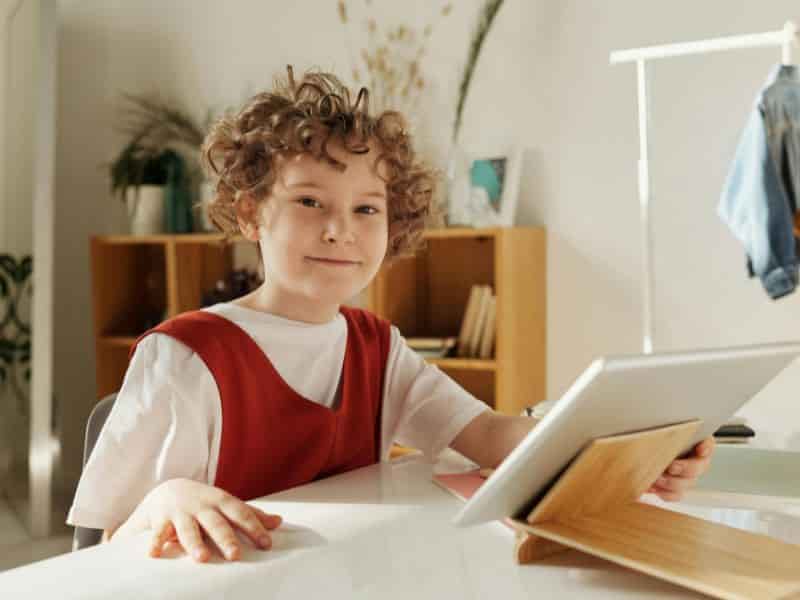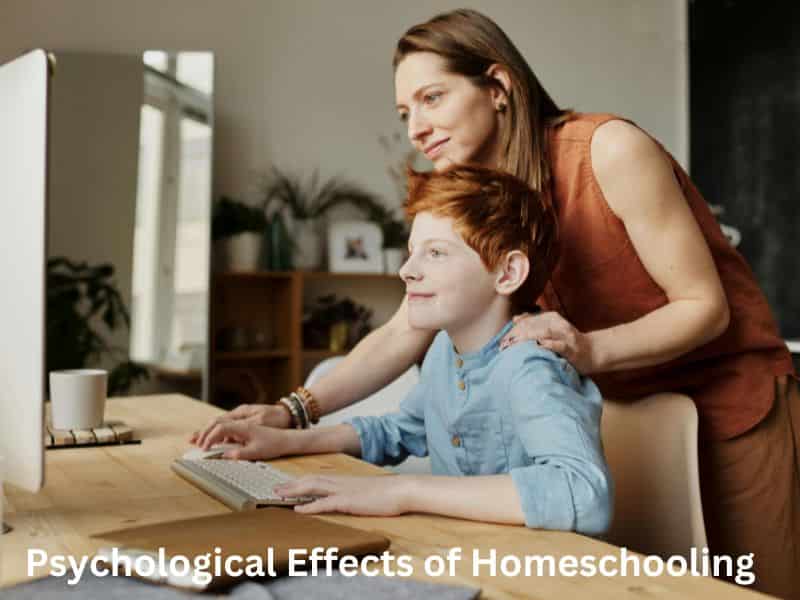Do you want to learn about the psychological effects of homeschooling for your kids? Then, this article is for you. I expect, from this post, that you may know everything related to the psychological effects of homeschooling for your child and enjoy the article.
However, during the last few decades, homeschooling has become very successful because some Moms and Dads prefer not to send their kids to school, they are not satisfied with common facilities, or they have urgent jobs, religious beliefs, or individuality training for children.
In this post, I have pointed out for you what are the effects of homeschooling on a child’s mental health, growth, and development since more parents are turning to this option.
From this article, you may learn both the positive and negative psychological effects of homeschooling and the mental health of your child.
I think you already understand what I am going to share with you for your dearest child. So first you need to learn what the psychological effects of homeschooling are to conceive the topic properly.
Let’s start to know our topics one by one for your better understanding.
What are the psychological effects of homeschooling?
Psychologically homeschooling has its benefits and shortcomings depending on situations that make it favor personal development and growing up in close families.
However, homeschooling may reduce social contact so overall it hampers a child’s social life and if not balanced with peers and other related co-curricular activities then may have an effect of isolation or weak social skills.

Here, we may refer to George Bernard Shaw who gives the importance of homeschooling. He says-
“My schooling not only failed to teach me what it professed to be teaching, but prevented me from being educated to an extent which infuriates me when I think of all I might have learned at home by myself.”
You will find two types of psychological effects of homeschooling:
- Negative psychological effects of homeschooling and
- Positive psychological effects of homeschooling.
If you cannot get a clear idea about the matter even now, No problem, we will discuss it in more detail. Read throughout the article, I believe that it will be clear to you.
To learn more about homeschooling read our blog post on the best free online homeschool programs.
Positive psychological effects of homeschooling on kids
Homeschooling gives several psychological benefits to the kids by creating a favorable environment to support the kids that are being homeschooled. Here are seven positive psychological effects of homeschooling:
- Enhanced Confidence
One-to-one instruction thus enables children to learn at their own pace, the virtue of which their self-esteem is boosted up because of mastering certain curriculum areas.
- Strengthened Parent-Child Bond
We argued that while homeschooling strengthens parental attachment and encourages interaction there is warmth and communication between the parents and children.
- Reduced Peer Pressure
Lacking the social environment filled with traditional schools, children become less pressured into compliance and thus can develop individuality.
- Customized Learning Environment
Most people state that homeschooling allows parents to provide a placid setting that doesn’t produce stress that may be present in other competitive schools.
- Greater Autonomy and Independence
Homeschooling children are more likely to become more independent, and manage their time as well as decision-making because most of the responsibilities are delegated to them.
- Stronger Mental Well-being
Due to the flexible environments of homeschooling, parents are in a position to manage their child’s emotional situation effectively without causing stress to the child and hence better emotional health will be the result.
- Encourages Curiosity and Love for Learning
Homeschoolers generally have direct interests, usually through developing a great love for learning since children engage in things that would appeal to them.
These positive effects help enhance aspects of a child’s psychological development hence helping both in academic and psychological aspects.
Negative psychological effects of homeschooling on kids
Despite its effectiveness in supporting students and parents, homeschooling can cause some psychological demerits to the learners where they are obeyed wrongly.

Here are five negative psychological effects of homeschooling:
- Social Isolation
Of all the problems associated with homeschooling the most frequently cited is social isolation away from school-age children. The traditional school has a timetable set aside for group work as a result children get to develop friendships and learn teamwork as well as social relations.
Some of the major concerns that arise from homeschooled children include the inability to handle privacy since children growing up homeschooled may lose the ability to manage solitude and may also have a tough time dealing with group situations later in life.
- Increased Anxiety
Others on the other hand may easily get confused due to the absence of regular school time and unclear timetables and lessons to be accomplished. This can cause increased levels of stress especially if the child is prone to protracted periods of transition or if the child is a self-starter kind.
- Weariness for Parents and Children
This emotional double responsibility ultimately frustrates most homeschooling families since the parent is also the teacher to the child. Parents might get moody to have their children succeed in school and such puts pressure on the child and makes their home environment strained.
As much as it can be motivating for the child after some time the parent and child may both feel emotionally drained in making it possible for the child to have the right learning experience.
- Limited Exposure to Diverse Perspectives
The children learning at home may lack interaction and exposure to different opinions from the outside world if the curriculum is designed according to the home environment and religion they follow.
This may result in having limited exposure to different cultures, beliefs, and attitudes which may make them closer to having a limited or rather biased view of the outside world.
- Difficulty in Developing Independence
Such a situation may lead to a problem of dependence of children on parents in case homeschooling is chosen as a type of education. There is no practical way of learning for the kids and this results in some of the difficulties that children can face including; a lack of self-discipline, lack of problem-solving, or lack of perseverance since they have never worked independently from their seniors like teachers in the conventional schools.
Such problems can prevent them from performing well in other activities that are challenging in the future, for example, moving to college or the workplace.
Homeschooling, while having many positive aspects, one must take into consideration the psychological implications presented here, to provide for one’s child a balanced experience.
Final Words
Psychological effects of homeschooling for children can be both positive, as well as negative. On one hand, it is likely to result in a close-knit family, being able to choose the topic of learning and promoting self-esteem while learning at your own pace.
However, problems like being home alone or having limited opportunity to relate to peers may result in such health-related effects as loneliness or anxiety, and overdependence on family. The externalization depends on the quality of homeschooling, the amount of parental participation, and the extent of social interaction.
Only in case the child is introduced to diverse parameters of the community, which are comprehensible yet engaging for him/her, it is possible to prevent adverse consequences and promote the balanced rather than the skewed evolution of his/her emotions.
Common FAQs on psychological impact of homeschooling
1. Is homeschooling good for mental health?
Answer: There is much to say about homeschooling improving students’ mental health, making education flexible and tailored to an individual child, capturing the stress from traditional school demands, and strengthening the family connection; however, social isolation should be mentioned as well.
2. Are there negative effects of homeschooling?
Answer: Of course, homeschooling results in social isolation, few after-school activities, and fewer opportunities to be exposed to other points of view. Furthermore, parents can lack educational achievements or cannot give their children specialized education.
3. How does homeschooling impact students?
Answer: On the positive side, homeschooling can ensure the mastery of considerable time for each learner, flexibility in daily schedules, and close-knit family relationships while, on the negative side, homeschooling could result in inadequate social interaction and restricted access to resources that a conventional school affords a learner.
4. What is the psychological effect of foster homes?
Answer: Overall psychological outcomes of foster homes are ambiguous; such as attachment crises, anxiety, and resilience. It would be challenging for children to advance their social identity along with the basic psychological issues of belonging and trust, however, they shall be capable of learning to manage stress and change.
5. What are the psychological effects of homeschooling?
Answer: Educating our children at home can promote the facets of character such as self-mastery, even self-training, and solidarity with family members. But, I believe it could also bring social detachment, some degree of anxiety, and added pressure on parents regarding educational expectations and, especially, emotional intelligence.
You can also look at our blog post on how to use keywords in content writing.

I am a content writer and English educator with over 10 years of professional experience. With a master’s degree in English Language and Literature, I specialize in creating educational content that is clear, practical, and easy to understand. As the founder of TakeEasily.com, I’m dedicated to helping students, parents, and teachers with valuable learning resources and insightful guides.


Excellent post for parents